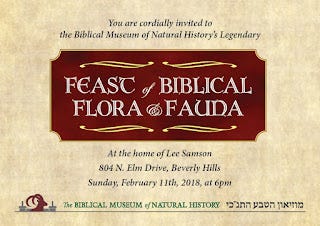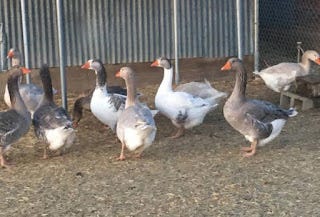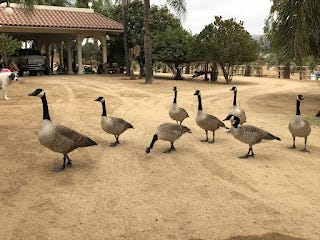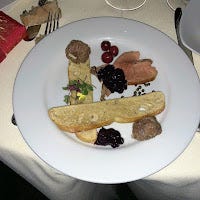The Wild Goose Chase
On Sunday, the Biblical Museum of Natural History held a Feast of Biblical Flora & Fauna in Beverly Hills, California. Here is my speech from one of the courses:

The most complicated item on the menu for the Beverly Hills Feast of Biblical Flora & Fauna was the goose. The fact that we are serving geese tonight is nothing less than a miracle. It nearly brought the chef and myself to tears. Here is the incredible but true story.
Geese are unusual creatures - when they grow up, they grow down. We wanted to have them on the menu because they are significant in a Biblical context. A description of the lavish banquet served at King Solomon’s table every day includes several types of mammals. But there is only one type of bird that is a sufficiently special food item to be included on this list, and that is "fattened barburim."
What are these barburim? In Modern Hebrew, barbur refers to the swan. But this does not seem to be the barbur of Scripture, since swans do not appear to have been fattened for the table in Biblical times. The same is true for ducks, which were fattened in the medieval period, but not in antiquity. Thus, the verse presumably refers to geese.
The wild graylag goose has been domesticated since ancient times. In the ancient city of Megiddo in Israel, carvings have been found of domesticated geese. These date from the ninth century BCE, which is during the reign of King Solomon, and thereby show that geese were eaten in that period. Indeed, ever since then, the goose has been prized as a delicacy. A famous Shabbat song lists the goose in this context: "Lehitaneg b’ta-anugim, barburim u’slav v’dagim - To delight in delicacies, in geese, quails and fish…"
So, we had to have goose on the menu. But it is extremely difficult to acquire kosher-certified goose. There is no commercial production of them. So, this would have to be specially arranged. And that proved to be more difficult than we could possibly have imagined.
First, we had to locate some geese. That is not easy. Geese are not raised in vast numbers like chickens or ducks. And this is the wrong time of year. Geese do not hatch year-round like chickens – they hatch in March and are slaughtered in the fall. Finally, we located a seller who said he had some geese of the American Buff breed. We were all set to go and collect them for shechitah.

Not American BuffBut then we received a somewhat blurry photo of the geese, and the geese in the picture were not American Buff. The OU promptly said that they could not certify them as kosher without knowing exactly what kind of geese they were and ensuring that they were a kosher type. Because the OU has very high halachic standards, and they don't want anyone to accuse them of being loose as a goose. And perhaps these geese were hybridized with Chinese geese. And there are some shochtim who have a custom not to shecht Chinese geese.
I have to say that I did not agree with this at all. Because while the geese in the picture were not American Buff, so what? First of all, they were clearly basically greylag geese of one breed or another. There was no particular reason to think that they were hybridized with Chinese geese. Second of all, even on the off-chance that they were hybridized with Chinese geese, so what? There is no real reason not to eat Chinese geese; nobody has ever proposed that there is anything at all wrong with them. What presumably happened is that some people simply lacked a tradition for them, and this evolved into a tradition not to eat them. Third of all, Chinese geese are fully interfertile with domestic geese, producing fertile hybrids, and there is ample halachic basis for stating that is if a bird is fully interfertile with a known kosher type then their offspring are kosher (as discussed at more length in my essay Chicken Wars).
Notwithstanding my arguments, the OU would not certify these geese without close-up detailed photos and an accurate breed description, which would rule out their being hybridized with Chinese geese. So I told the shochet to get on down to the farm as quickly as possible, and take good photos. I was frustrated at how the shochet seemed to lack a sense of urgency. Goose the gas, I said! But by this time, the seller had given up on us and had sold the geese in question to somebody else!

The Canada geese that were offered to usIt looked like our goose was cooked. But the shochet then asked me if Canada geese would be acceptable to the OU. Now, Canada geese are a species of wild North American geese, and there is obviously no tradition on them. So I told him that they wouldn't be good. But then I thought, Well, it doesn't hurt to ask. And lo and behold, the OU said that although nobody has ever shechted a Canada goose, they would approve it—because they are roughly similar to domestic geese and can hybridize with them.
(If you've been following, you'll notice that this appears to contradict the OU’s refusal to permit domestic geese which might be hybridized with Chinese geese. The OU’s response was that there was a positive custom against Chinese geese which doesn’t exist with Canada Geese.)
At this point, it was already Thursday morning, and the chef was getting frantic, since it takes a while to marinade and prepare geese for consumption. And it was dawning on us that there was a real problem with this shochet. He was of a certain chassidic group who just don't feel a sense of urgency about anything. It was 11am and he hadn't even left his home yet! So we told him to stop being loosey-goosey and to get on after these geese.
Several hours later, the shochet texted me that they were having great difficulty catching these wild Canadian geese. But I told him to stick at it, and that it would hopefully only be a wild goose chase literally, not figuratively. Finally, they captured six geese!
But now there was a new problem. Midday Thursday, we discovered that the OU mashgiach, to supervise the shechitah, was unavailable. He sent a message that he was otherwise engaged and we couldn't even reach him by phone! Thereby followed hours of frantic phone calls to friends in the OU. I was advised to drop some names to the highest levels of the OU. But who? A Hollywood star? Ryan Gosling?
The answer was our donors, the Geese that lay the golden eggs. Now, I am normally a somewhat shy person - I wouldn't say boo to a goose. But I spoke to the OU leadership, and I stressed the urgency of the matter, and I dropped the names of our donors. But I was told that there was nothing that could be done. Still, shortly afterwards I got a message that the mashgiach was suddenly available. Thank God!
And then I found out that the geese had escaped.

The pilgrim greese that were offered to usThis was beginning to look more and more like God was playing some kind of trick on us. But not to worry, said the shochet, he had a lead on eight domestic geese, of the pilgrim and Toulouse varieties, that were available, and he was on the way to pick them up.
And then the OU told us that our shochet was unacceptable.
Quite why this hadn't come to light in the weeks of preceding discussion is a question that I still don't have an answer to. Somehow both the shochet and the OU had neglected to inform us that the shochet was not on the OU’s approved list of shochtim. And finding a shochet in Los Angeles is no easy matter. The OU flies in its own shochtim from the East Coast weekly, and they had just flown back. There was one local shochet that they named who might be acceptable, but he was out of town.
By this point, the chef and I had totally given up on getting geese. It was a tremendous disappointment, and we were trying to figure out what to serve instead.

The geese: end result
But then I got a text from the original shochet saying not to worry, he had it all sorted, they had tracked down the shochet who was out of town, he was on his way back, and they were on the way to shecht the geese, with the OU mashgiach, in someone's backyard.
At one-thirty a.m., on Friday morning, the chef received eight shechted geese. When I got the news, I broke out in goose bumps.
So, that's the extraordinary story behind the geese that we are serving tonight. The chef and I are not exactly sure who is to blame for the fiasco. No doubt, when we finally get the bill from the guy who was assigned to handle this, it will be through the roof. So we're going to tell him to do something that a duck can't do but what a goose can do: to stick his bill up his tuchus.


